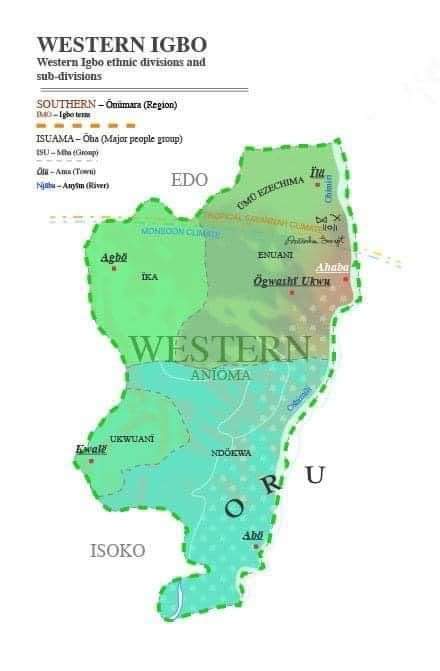
When one refers to an Igbo as "Northern", "Southern", "North-Eastern" or "Western Igbo", he is not being divisive or discriminative.
His description is based on the geographic location of the people within Igbo land, as regards the four Winds, North, South, East and West.
Every single person or visible, concrete tangible entity on earth, has its North, South, East and West!. Wherever you face becomes your North. Your back is your South. Your left hand becomes your West as your right is your East.
According to the global geographical and cartographical systems that places the earth in-between two poles, the North and South, Nsụka is in the Northern parts of Igbo land.
When you stare at a Map, the upper part of the map is the North. The left side of the map is the West. The right side is the East and the lower part is the South.
The River Niger divides Igbo land into two unequal parts. The part that is located at the left side of the Niger is the Western part of Igboland or the West-Niger Igbo. To an extent, some towns immediate to the Eastern (right hand side) banks of the Niger, could also be called "Western Igbo" since they are still further away from the geographical "middle" "centre" or "heartland" of the Igbo.
Hence, Olu towns like Oguta, Ndoni, Ogbaru, Osomala, Ogba, Onitsha, etc, are technically Western Igbo!. It should not be surprising that culturally, ancestrally and dialectally, they share more in common with those across the river than with those further to the East.
The coming of Colonialism balkanized Igbo land When it used the river Niger as a "Natural boundary" between the defunct Eastern and Western regions. However, the River Niger wasn't used in determining the boundaries of the Northern Region with the Western Regions. The Northern Region had territories on both sides of the Niger.
Also, although the Eastern Region was directly below the River Benue, ethnic boundaries were considered and the Northern Region had two sides on the River Niger.
The Igbo and the Yorùbá had their territories balkanized into different regions. While a large chunk of the Yorùbá were administered in the Northern Region of Nigeria, with headquarters at Kaduna, the Igbo areas West of the Niger was administered under the Western Region, headquartered in Ibadan, hence, Asaba which was less than 150 km from Enugu, the Headquarters of the Eastern Region that had the majority of Igbo, was answerable to Ibadan hundreds of kilometers away.
Also, pockets of Igbo peoples in Eke-Avrugo, Ibaji, Akpanya, Ọnicha-Igo, etc, in today's Kogi State, and some in present day Benue State, were administered by the North from Kaduna.
Hence, the Igbo people West of the Niger became "Igbos of Western Region". Apart from Ndoni that was located at the East bank of the Niger but still administered under the Western Region, the other Communities to the immediate East bank of the Niger who were technically "Western Igbo" as Earlier explained, became known as "Eastern Igbo", to distinguish from those Igbo Administered under the Western Region.
Ndoni, Ogbaru and Oguta were Neighbours both located East of the Niger. But by this regional political balkanization, scenario, Ndoni became Western Igbo while Ogbaru and Oguta became Eastern Igbo !
The Midwestern Region was later created after the deliberations and unsuccessfu
l attempts to administer the West Niger Igbo together with those East of the Niger, as one people. The Western Igbo Became known as "Mid-Western Igbo"
The latter creation of Bendel State brought about the term "BenDel" Igbo. Then in 1991, with the creation of the multi-ethnic Delta State, after the proposed ANIỌMA state had not been achieved, brought about the term "Delta Igbo".
The native name, Aniọma as a term has united the people more, giving them a unique sense of relevance, strength and belonging. The name "Ika-Igbo" as they were all collectively called by the British Anthropologists, may not have been a more appropriate name as they comprised more than just the Ika.
Although said to have stemmed from the combination of the initials of Aniọcha, Ndokwa (although it means "vault" or "state of rest" in some Igbo dialects, is a combination of Nd'osumili and Ukwuani), Ị̀ká and Oshimili. The "MA" Suffix added to the ANIO acronym had given the name ANIỌMA which means "Land of Beauty" or "Good land".
Technically, the Igbo people immediate to the East banks of the Niger are by the Igbo geographical definition Nd'osumili or Oshimili people and therefore technically Aniọma people too!.
Oguta, Onitsha, Osomala, Ndoni, etc.
The Aniọma people had resisted the British in a 30 year old series of warfare called "Ekumeku", just as the North-Eastern Igbo led by the Aro had resisted the British for three years.
Also, although being in the MidWestern Region that remained Nigeria, the Aniọma had been major key players in the Biafran Army during the three year War that threatened the extermination of the Igbo.
Many of the most reputable Igbo people in the sectors of finance, politics, entertainment, literature, sports, business, education, are from the Aniọma region.
© Akachukwu Vitalis
Photo credit: Ụ́kpụrụ